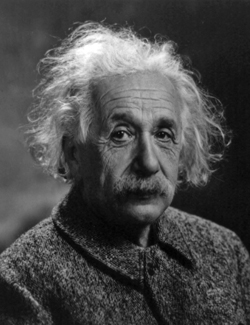Death of a Genius

Image credit: Orren Jack Turner via the Library of Congress
Albert Einstein
The world has just lost its greatest scientific mind. Albert Einstein died in his sleep on April 18th from complications of a gall bladder infection. He was 76. There is no doubt that this rumpled, white-haired, pipe-smoking professor looked deeper into the nature of the Universe than any other man. In death he joins a select few – such as Newton, Copernicus, Archimedes and Pythagoras – as a giant in science whose genius changed the course of history.
The immediate outpouring of praise for the German-born scientist begins to reveal his place in history. President Eisenhower said "No other man contributed so much to the vast expansion of 20th century knowledge." Moshe Sharett, the Prime Minister of Israel, stated "The world has lost its foremost genius." There were even eulogies behind the Iron Curtain. Pravda, the official newspaper of the Soviet Union, described him as, "A great transformer of natural science."
Einstein's achievements are better known to his coworkers and students, who still work to understand, test, and apply his theories. Examples of these are:
- His revolutionary re-thinking of light as not just waves but particles
- His theory of special relativity, which explains that nothing in the Universe can move faster than the speed of light.
- His most famous equation E = mc2, which explains how matter can become energy, and energy can become matter
- His space-time bending theory of gravitation
Taken together, Einstein's ideas are the basis of all modern physics. Non-scientists know Einstein was a genius, but don't really understand many of his theories. The average person knows that television and the hydrogen bomb are the results of his work, but doesn't understand how it is so. We are like the nurse at Einstein's deathbed who failed to understand the great man's final words that were spoken in German. She did not speak German. Most of us do not speak physics. Instead, we sense the importance of the man indirectly. We watch like children at a parade, as his life and his genius pass before us. •



